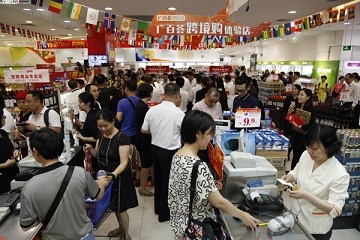Chinese cross-border e-commerce operators have opened retail stores in Guangzhou’s traditional commercial hub, the China Business News reported.
The report said that during the first six months of the year, Guangzhou has registered some 397 cross-border e-commerce operators which sell imported goods online, 158 of which have already opened for business.
Guangzhou's first physical store, MeijoyBest opened on Jan. 23 and allowed customers to sample and order goods available on its website. Following it, 20 more stores opened in the city, the report said.
The report added that one store, opened by Funsens on Oct. 1, had attracted nearly 40,000 visits that day, while another one owned by property developer Lee Garden recorded over 30,000 visits on the same day.
Since favorable government policies and strong demand gave rise to cross-border e-commerce and their physical shops, several department stores also announced plans to open similar shops across the country, the paper said.
The Ministry of Commerce reported in May that cross-border online retail sales grew 44 percent year-on-year to $71.8 billion in 2014.
The paper, however, found that the goods displayed by these stores do not vary, which include mainly personal care items, baby products, cosmetics and snacks. In addition, the imported items with lower tariffs displayed in these stores are only 10 percent to 30 percent cheaper.
According to the paper, this showed that several vendors who adopted the popular cross-border e-commerce concept were out to make profit at a time when customers do not know the differences between websites offering foreign products and supermarkets selling imported items.
A Funsens executive said that they can offer foreign goods at lower prices since cross-border e-commerce operators only pay tax on mail-delivered packages.
Major e-commerce players in China have also moved into the cross-border business, such as Netease's Kaola shopping site, which launched a platform in June to showcase foreign baby products.
In addition, Alibaba's shopping site TMall was also reported to be working with department store operator Intime Retail on having physical stores.



























